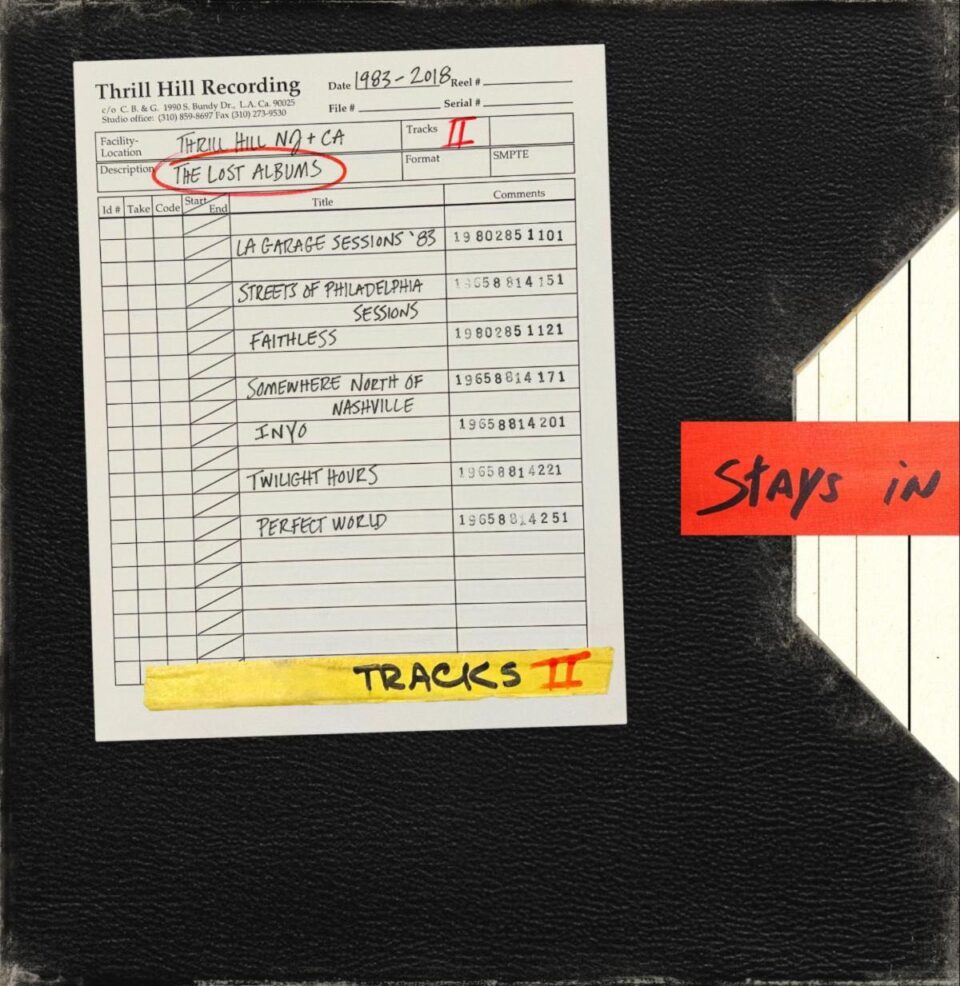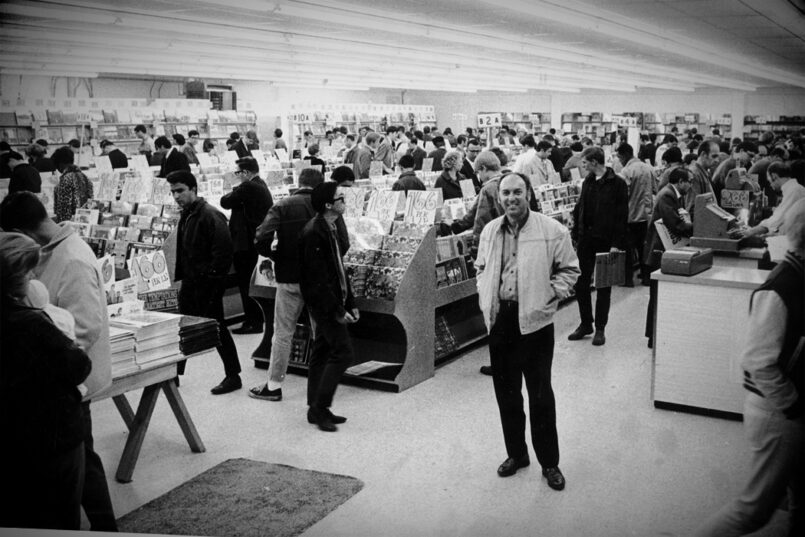With big, black cases fat with CDs tucked under our arms and a crinkled copy of NME sunbathing on the dash, my best friend and I would pile into my Jeep Cherokee and make the ninety-minute drive from Baton Rouge to the glistening yellow-and-red music Mecca on South Peters Street in the beating, tom-tom heart of New Orleans’s French Quarter. Mostly we were hunting obscure Radiohead and Blur b-sides.
We came for the UK imports we couldn’t find at home, but our record discoveries rarely stopped there. And our takeaways were never just those small, shiny plastic discs Rolling Stone’s David Fricke dismissively called “dopey” at the time. This was sunken treasure we’d found. And the finding was part of the treasure, too, one that the click of a button can’t ever replicate.
We repeated this act throughout high school and college, and it turns out the daylong pilgrimage was about much more than rock and roll. This was ritual. And ritual lasts. Until it doesn’t, of course, and it passes into memory. Maybe even myth. Two years after the chain first filed for bankruptcy, the Tower Records in New Orleans—and every other US location—closed its doors in 2006. One local headline of the day? “The End of an Era.”
My story’s not unique; everyone of a certain age has a story about Tower Records. But for the cavalier men and women who actually launched the global music-selling empire, what is their story? Colin Hanks—actor, documentary producer, son of Tom—set out seven years ago to answer this very question. Hanks’ feature documentary All Things Must Pass: The Rise and Fall of Tower Records has arrived as a time capsule of a recently passed era and a love letter to those who rode the roller coaster that was the rise-and-fall of an unlikely entertainment icon.
Despite some significant star wattage—Bruce Springsteen, Dave Grohl, David Geffen, and Sir Elton John all make appearances—and the eponymous, soaring George Harrison song that serves as the documentary’s theme, the film strikes a humble balance, staying focused on the people who were there on the ground, behind the counter, and in the aisles as Tower took off—whether they ended up becoming famous or not.
“I wanted to avoid two things: Number one, having the first three minutes of the film tell the audience how special Tower is with lots of famous faces; and number two, having a narrator,” Hanks says. “And those two things proved a little tricky not to do. It was important that the rock stars’ voices be treated just like everyone else’s. Just like a store clerk’s. We wanted to be economical in every sense of the word with the rock stars. This is Russ Solomon’s story, and the story of his team.”
Tower’s surprisingly humble beginnings trace back to 1960, when Solomon began selling used jukebox 45s for ten cents apiece at his father’s drug store in Sacramento. From there, a flagship was planted in San Francisco. Then a massive store on the Sunset Strip. Then locations the world over, where they thrived for decades before the big squeeze of Napster and iTunes, as well as the big-box retailers who used economy of scale to slash their record prices, sounding the death knell for Tower.
“Growing up in Sacramento, there was a sort of civic pride about Tower Records having started there.” — Colin Hanks
“Growing up in Sacramento, there was a sort of civic pride about Tower Records having started there, that warm hometown connection,” Hanks says. “So when that store closed and others started closing, I was bummed. I loved them. Tower Records was my candy store. It’s where I spent my money as a kid.”
The clubhouse vibe is also what hooked Steven Leckart, the film’s writer. “As soon as I got my driver’s license, I started going to Tower on Sunset on the weekends,” he says. “I loved how you could browse the racks for as long as you wanted and nobody ever hassled you to buy anything.”
Sir Elton recounts having the store managers open early for him on Tuesdays so he could buy up new releases as soon as possible. The Boss waxes poetic about hanging out in Tower whenever he didn’t know where else to go, just another one of the “lost boys.” Hanks and Leckart reeled in these stories and more—tales of decadence and devotion—as their crew worked off and on for years while different rounds of financing came through the door. “I learned a lot hanging with Russ,” Hanks says. “His sort of hands-off management style of collaborating, letting others contribute, building a family environment, following your gut—all of that rubbed off on the production and really impacted me as a director.”
“Russ is a mensch,” Leckart adds. “He was open to discussing everything, including his mistakes… We spent hours talking about his childhood, the good old days, the men and women who helped him shape Tower, what went wrong—everything, really.”
Zooming through political upheaval, format wars, disco’s dominance and demise, the rise of hip-hop and more, the resulting film is a raucous, character–driven ride through multiple cultural revolutions that have now defined the modern music era. Solomon and the story of Tower Records provide a suitably kaleidoscopic lens for this pocket history. “It was music that was important to young people’s lives,” Solomon says wistfully in the film. “And we were how they got it.”
Interest in All Things Must Pass may be piqued more now that the record giant’s implosion is smaller in the rearview mirror, too, Hanks says. Nostalgia is a powerful force. And yet many music buyers’ relationship with Tower could be more complex. Its role in shuttering mom-and-pop shops as it rapidly expanded in the 1990s is undeniable—and a subject unfortunately glossed over here. While the topic of consumer backlash against rising CD prices is broached, Solomon’s thoughts on slaying his smaller competitors would have been welcome. Hearing directly from some of those mom and pops would have been even better, because that’s how Solomon himself began when he was slinging vinyl next to a soda fountain and the cosmetics aisle.
And yet, unlike Blockbuster, Tower rarely felt like a monolithic, faceless chain, even at its peak. Thanks to Solomon and his cohorts, his company traded in the serialization of a more freewheeling, personality–driven vibe. Each store was, to some degree, independent of the last, open to building its own culture, its own rituals. Tower was the only place a pre-Nirvana Dave Grohl could get a job without having to cut his hair, for instance. “Every [other] music store, whether it was to buy drumsticks or records—total snobs,” Grohl says in the film. “Employees could listen to any- and everything,” Leckart adds. “They could dress and act basically however they wanted. And, in time, they all became a de facto family.”
Solomon himself remains an everyman, anything but pompous. He says Tower’s bygone success was due in large part to not establishing an employee dress code, as if a billion dollars in sales in 1999 was simply because of the ethos that let his 100,000 workers just be themselves. In Solomon’s mind, that jives.
“No music, no life,” was his store’s heartfelt slogan for decades. And Solomon lived it. The music lives on, of course, both online and at fantastically curated independent record shops across the world, but with the shuttering of Tower Records, a big part of how we encounter that music has now been buried. With All Things Must Pass, Hanks does the digging and pulls up a bit of treasure to let it shine. FL










